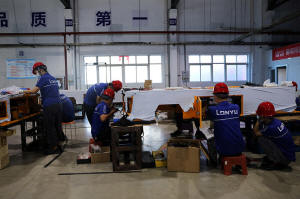China's forecast-beating economic data buys officials time to figure out
fix
 Send a link to a friend
Send a link to a friend
 [April 01, 2024] By
Joe Cash [April 01, 2024] By
Joe Cash
BEIJING (Reuters) - China's $18.6 trillion economy has skirted some
near-term downside risks as suggested by recent indicators, analysts
said, buying officials more time to convince investors they can fire up
a new growth engine for 2024 and the years ahead.
Economic data over the January-February period and a factory owners
survey for March offered relief to Chinese policymakers seeking to
convince foreign investors they could rekindle the world's No.2 economy
after it failed to post a sustainable recovery following Beijing
abandoning strict COVID curbs in late 2022.
But analysts and investors are cautious: while things might not be
getting worse, unless officials can figure out how to get it to fire on
all cylinders again, the market once seen as the engine of global growth
will stall later in the year.
China has taken a series of steps to invigorate its economy,
including guiding banks to lend more to high-end manufacturing
rather than real estate and reducing the amount banks must hold in
reserve, but such policy measures are becoming less effective and could
even be scaled back, they said.
"China is pushing to have a normal 2024. They know they can still
export, and they know that if they push this year, they can buy
themselves time," said Alicia Garcia Herrero, chief economist for the
Asia Pacific at Natixis, .
"But China cannot grow more than last year, and it never will, as the
fiscal cost of growing more than it did in 2023 is so huge," she added.
"China's growth model is not sustainable."

China's factory output and retail sales topped forecasts in
January-February, joining better-than-expected exports and consumer
inflation indicators, providing an early boost to Beijing's hopes of
reaching what analysts have described as an ambitious 5.0% gross
domestic product growth target for 2024.
Citi on Thursday raised its economic growth forecast for China for this
year to 5.0% from 4.6%, citing "recent positive data and policy
delivery".
But China "faces a fork in the road" and needs to "reinvent itself for a
new era of high-quality growth," International Monetary Fund Managing
Director Kristalina Georgieva told an international investment summit in
Beijing last week.
The IMF in January revised its forecast up 0.4 percentage points to
4.6%, citing increased government spending, which remains short of last
year's actual 5.2% expansion.
Officials are putting their faith in "New Productive Forces", a term
coined by Chinese President Xi Jinping in September underscoring the
need for economic development based on innovation in advanced sectors.
Still, analysts question whether China can maintain growth and transform
its economy at the same time.
"China is barely keeping up with a growth rate that is decelerating, so
(the data) is not 'green shoots'," Garcia Herrero said.
[to top of second column] |

Employees work on assembling automated guided vehicles (AGV)
at a Lonyu Robot Co factory in Tianjin, China, September 7, 2021.
Picture taken September 7, 2021. REUTERS/Tingshu Wang/File Photo

"5.2% is not the bottom, it's the top," she added.
Rhodium Group estimates actual growth in 2023 was more like 1.5%,
rather than the official government figure, owing to an ailing
property market, limited consumer spending, falling trade surplus
and battered local government finances.
"Looking ahead, China may see a cyclical recovery to perhaps
3.0-3.5% growth in 2024," the New York-based research group known
for its China coverage predicted in December.
PROPERTY QUANDARY
Officials are confident China will hit its growth target of around
5% this year.
But investors want more details on the government's plans to limit
the damage a long-running debt crisis in the property sector is
exacting on growth and how Beijing will boost domestic consumption
to keep Washington and Brussels at bay, both of which are weighing
up action against Chinese exports.
"China is off the map. And that's something that they've barely
started to grapple with," said Rogier Creemers, an assistant
professor of Chinese studies at Leiden University.
Analysts warn officials are running out of time to come up with a
new growth model because the latest bounce in the data was buoyed by
the government injecting money into the economy and the Lunar New
Year, which fell in February this year, giving consumer prices and
retail sales data a leg-up.
"Given the near-term tailwinds from stimulus, growth should continue
to do reasonably well in the near term," wrote Zichun Huang, China
Economist at Capital Economics, in a note. "But once policy support
is scaled back, probably later this year, structural headwinds mean
the economy is likely to slow again."
China's property sector, which used to represent 25% of the economy,
looms particularly large.
Property investment and sales fell more slowly over the first two
months of the year, supported by government efforts to arrest a
protracted downturn in the sector, but analysts still worry it could
prove to be the economy's undoing.
"(Officials) are basically fire-fighting at the moment to ensure the
economy doesn't skid off the rails," said Frederic Neumann, chief
Asia economist at HSBC in Hong Kong.
"But there's the longer-term question of what will drive growth in
the future, once the property sector subsides."
(Reporting by Joe Cash; Editing by Muralikumar Anantharaman)
[© 2024 Thomson Reuters. All rights
reserved.]
This material may not be published,
broadcast, rewritten or redistributed.
Thompson Reuters is solely responsible for this content.
 |